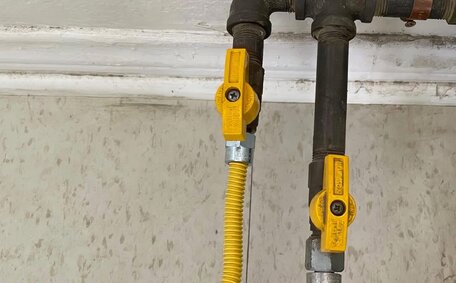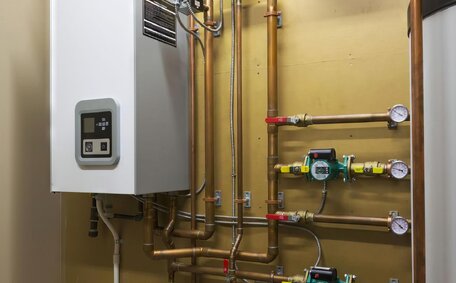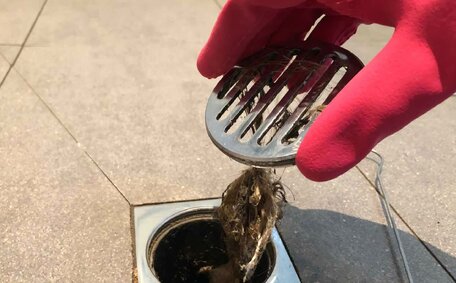Can blocked drains actually cause flooding?
Blocked drains, often due to plumbing and gas issues, can indeed cause flooding in your home. Obstructions prevent water and gas from flowing freely in your drainage system, highlighting the necessity for professional intervention. Increasing volumes of water entering the drain system can become trapped behind a blockage causing overflows, hence the urgency in resolving these issues promptly to prevent flooding.
Several scenarios reveal how severely blocked drains can cause disastrous household flooding:
- Kitchen and bathroom sinks may overflow when drains are blocked, causing water to flood countertops and floors.
- Blocked stormwater drains, clogged with leaves and debris, can cause flooding during heavy rain by preventing water from draining away.
To maintain clear drains, regularly use drain cleaners and avoid pouring grease or solids down the sink. If you encounter signs of blocked drains, such as water pooling around them, contact our team promptly for professional plumbing services.
The longer the obstruction lasts, the higher the risk of back-up, which demonstrates how such blockages can cause major flooding and considerable damage to your property.
Understanding how drain blockages lead to flooding
Drain blockages can lead to flooding in a few key ways:
- A blockage in your sink can result in water backing up and overflowing, flooding your bathroom or kitchen unexpectedly.
- Blockages in the main sewerage system can induce sewage to reverse its route, causing it to flow water back into your house’s bathtubs, toilets, shower drains, and additional areas, leading to unsettling situations. This results in scenarios where the water has nowhere to go, which can lead to it spilling out uncontrollably.
- Congested stormwater drainage pipes hinder rainwater from draining away properly, serving as a primary reason for significant flooding around the house’s foundation.
- Fully obstructed interior drain pipes can lead to leaks as pressurised water seeks alternate paths, sometimes resulting in water flowing back into living spaces via walls or ceilings.
Identifying causes of clogged drains involves recognising common culprits including:
- Cooking oils, fats, and grease accumulating in your pipes are significant contributors to blockages.
- Build up of soap scum, hair, food waste, and other organic materials
- Tree roots infiltrating pipes through foundation cracks can bring in dirt and debris, clogging your drainage system.
- Improper disposal of solids like baby wipes or hygiene products that cause blocked drains
Adopting preventative strategies ensures backups are thwarted and safeguards your water systems, preserving the damage a clogged drain can inflict – this entails routine cleaning of your drains and avoiding the disposal of fats and solids down your sink. Yet, if signs like pooled water, sewage odours, or slow draining emerge, seek a professional plumber as soon possible to tackle any blockages before flooding becomes an issue.
Identifying early signs of a blocked drain
Catching a blocked drain in your toilet early is crucial to avoid major plumbing issues down the line. Watch for these early signs to spot a clogged drain:
- Water draining slowly - If it takes longer than usual for water to go down the drain, this could point to a blockage your pipes are experiencing.
- Gurgling sounds from pipes when water drains, signalling air and water are having trouble passing through.
- Bad odours coming from the drain, potentially from built-up organic matter.
- Pools of water around sinks, tubs, or exterior foundation drains after use.
Regular maintenance preserves drain integrity, prevents blockages, and allows for the early remedy of signs. Look for accumulating hair, grease, and debris. It also helps to listen for noises and notice changes in your drainage system’s performance.
Faced with issues such as broken pipes, enlisting a plumber promptly to remove blockages can prevent further complications.
Preventive maintenance to avoid blocked drains
Regular drain maintenance can prevent clogs and ensure an unobstructed plumbing system in both domestic and commercial settings. Here are some tips to help prevent blockages:
- Pour cooking oils into a heat-resistant container instead of down the sink to get rid of them via trash disposal. Avoid washing fats, oils, or grease down the sink to prevent solid blockages.
- Installing sink strainers and drain covers helps to catch debris before it enters your drains.
- To safeguard against the factors that induce clogged drains, flush your drain pipe weekly with a blend of baking soda followed by vinegar. Let sit 5-10 minutes before rinsing with hot water.
- Use a drain snake monthly to remove accumulated hair and debris. Wear gloves for protection.
- Keep your bathroom drains in pristine condition, always clean your bathroom drains, and free them from hair and soap residue, ensuring water in your bathroom flows without impediment.
- Prune trees and bushes around the foundations and drains pipes, preventing roots from intruding, a process that can begin a series of unseen blockages.
- Inspect outdoor drainage areas before the wet season arrives to ensure no obstructions find their way into the system. Remove leaves, sticks, and other debris.
Adopting these preventive measures can alleviate the burden on your drainage system and keep it free from blockages. But if you notice any signs of a slow or clogged drain, contact a professional plumber right away to avoid backups and flooding.
DIY versus professional drain cleaning
Homeowners can attempt various DIY solutions to tackle a blocked drain; being thorough is the only way can anyone manage the challenge, employing a plunger or drain snake to utilising baking soda and vinegar, or commercial drain cleaners. These methods can dislodge minor blockages and improve slow drains, regardless of the clog’s stubbornness.
Nevertheless, when it happens that severe blockages are persistent, the specialised skills of drain cleaning services become necessary, prompting you to seek out expert assistance. Reasons to call a plumber include:
- DIY efforts don’t solve the clog after multiple attempts
- Significant backups, flooding, foul odours or other major drainage issues that can occur in your home
- Need for video inspection to identify complex drain obstructions
- Suspected issues in main sewer lines or underground pipe systems
- Tree root intrusions or pipe damage contributing to backups
Professionals can effectively tackle persistent clogs using high-pressure hydrojetters, delivering up to approximately 34,500 kPa of water pressure. They also use augers and CCTV cameras on cables to thoroughly inspect drains and identify exact locations of obstructions. For critical drain issues beyond basic home fixes, rely on the extensive years experience reflected in the skill of your local plumber, like that of the team at Jannali Plumbing.
The risks of neglecting a blocked drain
Neglecting a blocked drain can have serious consequences for your property and jeopardise your health:
- Backed up sewage, if not addressed, can spill into bathrooms or basements, potentially causing significant inconveniences, offensive smells, and water damage that will require your effort to repair any resulting issues.
- Standing water can attract vermin, posing health risks and requiring prompt resolution. Standing water can also foster the harmful effects blocked by drains such as nurturing bacteria including E. coli and Salmonella.
- Untreated blockages can worsen over time as debris accumulates, magnifying the negative effects on plumbing systems. Roots, grease or mineral deposits can harden, making clearing the clogs much more difficult and costly down the road.
- Ignoring a blocked kitchen drain can result in an accumulation of food particles and grease, which may cause pipes to burst eventually. This could lead to ruptures or disintegration of ageing pipework, risking your water supply becoming contaminated water if left unresolved for a long time.
- Clogged pipes can impede your stormwater system’s ability to manage runoff properly. Such situations increase the risk of property damage from flooding, necessitating immediate drain repairs to prevent soil erosion, foundational damage, and an increase in mosquito population.
At the first sign of blockage, it’s vital to contact professional plumbers promptly. The experts at Jannali Plumbing have the high-powered equipment and expertise to thoroughly clear any clogs and prevent hazardous backups or pipe failures on your property.
How to address an outdoor drain blockage
Outdoor drain blockages often occur where your drainage pipes are met with a build-up of leaves, debris, and assorted material that impede proper water drainage. Here are some tips for clearing an outdoor clogged drain:
- The most effective method to displace leaves, sticks, mud, and other debris clogging the drain opening is to deploy a drain snake or auger.
- A high-pressure garden hose can dislodge stubborn blockages and restore water flow.
- Periodically
- Clean nearby gutters and downspouts to prevent future transfer of leaves/debris from the roof.
- Consider using an enzyme drain cleaner or bacterial additive to break down organic material and prevent future clogs.
For outdoor drain clogs that resist home remedies, our team at Jannali Plumbing is available to help. Trust in our expertise to resolve any outdoor drainage problems effectively.
We use high-powered hydrojetting to thoroughly clean interior and exterior drain pipes. Our team also conducts detailed inspections of your sewer for any damages or root intrusions causing recurring blockages.






